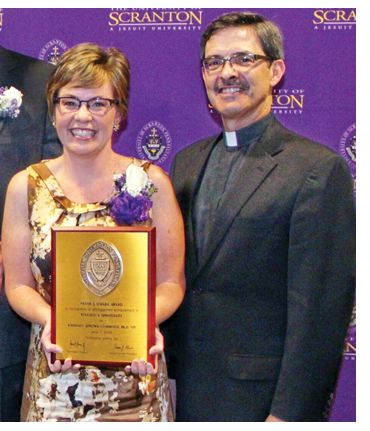In February 2013, Pope Benedict resigned and, perhaps just as abruptly, Kathleen Sprows Cummings, Ph.D. ’93 G’93, director of Notre Dame’s Cushwa Center for the Study of American Catholicism and vice-president elect of the American Catholic Historical Association, became a pundit.
“Those five weeks between the pope’s resignation and the conclave were huge,” said Dr. Cummings, who is also an associate professor of American studies and history at the University of Notre Dame. That time was momentous for the world, especially for Catholics like Dr. Cummings, but it was also “huge” for her career. She appeared on NBC’s live coverage of the conclave. “After the conclave, I thought, ‘This has all been a blast for me, but it’s over now. We have a pope.’ Then, of course, it wasn’t over.”
Good for Business
Pope Francis, as Dr. Cummings likes to say, has been “really good for the business of Catholic history” and his election and popularity led to even more work for her on major news programs.
Following the conclave, she appeared on NBC’s live coverage of the canonization of Popes John Paul II and John XXIII. (Her forthcoming book is called Citizen Saints: Catholics and Canonization in America.) Most recently, for NBC’s live coverage of the papal visit to the United States in September 2015, she broadcasted live from the rooftop over Saint Patrick’s Cathedral in New York, and then traveled to Philadelphia. She was on air with Chris Matthews and Tamron Hall, and she appeared on the “Today” show.
She was (and is) quoted often in various print media about all things related to Catholic history, but there was something about doing live broadcasts for a major news network that surprised and excited her.
“Sometimes I think, ‘How did this history professor get to be on TV?’” she said with a laugh. “But I guess it does make sense. I see it as one giant classroom. As a professor, it’s my job to explain the complexity of things. I can do that. On TV, it’s a little different because you have to boil something down to essentially a sound bite, but not dumb it down. You have to be intellectually responsible.”
After the white smoke appeared and news of Pope Francis’ election broke, Dr. Cummings was invited to talk about it on “Nightly News.” When Brian Williams asked for her reaction, she mentioned her Jesuit undergraduate education as a talking point.
“I felt an identification with Pope Francis right away because of that Scranton connection,” she said in a recent interview.

A Gateway to the World
As a teenager, Cummings (then Sprows) was hesitant to leave her hometown of Aston, outside of Philadelphia. She grew up as part of a devout Catholic family that “always encouraged me to study and work hard,” and she wasn’t ready to venture too far from that unit.
“Scranton was only three hours away, but it might as well have been across the country as far as I was concerned,” she said. “Looking back, I think subconsciously I knew that it would be good for me to broaden my horizons by moving beyond the Philadelphia area. It may sound kind of silly to think of Scranton as a gateway to the world … but that’s what it was for me.”
Bernard McIlhenny, S.J., then-dean of Admissions, met Cummings as a prospective student. He helped her “weigh the pros and cons” of moving away to come to Scranton, and he personally offered her a full-tuition Presidential Scholarship. “I was so impressed by her maturity and her ability to see the big picture,” he remembered.
She ultimately chose Scranton, where she was selected to the Special Jesuit Liberal Arts Honors Program (SJLA), which, she said, “taught me to read and speak.” She completed the four-year BA/MA history program and was encouraged by her professors to go on to graduate school. She chose to go to Notre Dame for her doctorate.
“It turned out to be the best place for me to study American religious history,” she said. She lived with a friend from the University in South Bend. “It was a way to bring a little bit of Scranton to Notre Dame.”
Broadening the Conversation
Dr. Cummings continued to surprise herself by moving even farther away from Aston and far from Scranton, too. She did not think she would stay in Indiana, but she met her husband and had her children there. And she was drawn back to Notre Dame when she was given the opportunity to lead the Cushwa Center, which brings together scholars to “interpret the American Catholic experience.”
This is the perfect job for someone who not only trains scholars, but tries to “get people to think differently about the church if they’re not Catholic, and think more deeply about Catholicism if they are.”
As a commentator on the news in the past several years, she has been able to address issues she is passionate about, with seven million viewers watching. One such issue? Getting more women into church leadership positions.
“Pope Francis said that it’s important to talk about women in the church, but he hasn’t said what he means by that. Why are only the ordained to be in leadership? Where is there a space for women?” she asked. “For Pope Francis, no subject is off the table, and everything can draw you closer to God. That’s a very positive way of thinking, and very Jesuit as well.”




